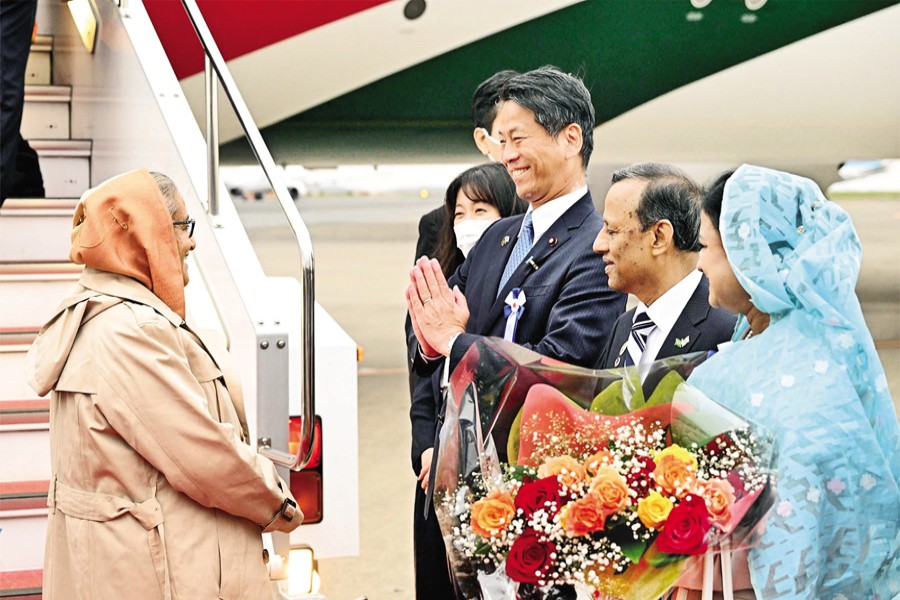
Published :
Updated :

As the official visit of the prime minister has come to a close, it is time to recap what has been discussed between the delegation and its Japanese counterpart. The bilateral relationship between the two nations has been deep and cooperative since independence. Japan extended its hand in more than friendship as war-torn Bangladesh began the painstaking journey of rebuilding a shattered economy. In over 50 years of friendship, Japan has stood by Bangladesh during all the tumultuous times and today, the economic ties are deeper than ever.
The country is being touted as a regional hub for investment. This was reiterated during the just-concluded visit of Prime Minister Sheikh Hasina to Japan. There have been talks of taking the Dhaka-Tokyo investment ties to a new height and a special economic zone established specifically to attract Japanese investments is a pointer to that fact. The government, for its part, is enacting policies that will give further impetus to streamline regulatory processes in an effort to make it easier for foreign investments to set up plants in Bangladesh. This is being done to make Bangladesh the obvious choice for Japanese companies which wish to diversify their investments in the China+1 policy that has been adopted. It is not simply special economic zones that are being set up, but real time investments are going into developing high-tech and software parks and these are areas where scope for foreign investment is also open.
It makes sense to woo Japan, which is one of the most technologically-advanced nations in the world. However, for any of this to pan out, Bangladeshi policymakers need to turn statements into actions on the ground since reforming and simplifying regulatory issues have been talked about for a long time. Time has arrived to match words with action on the ground because Bangladesh has missed out on big foreign investments like the South Korean Samsung plant, which was supposed to be set up here ended up being setup in Vietnam. These are lessons for Bangladesh, and hopefully lessons that have been learnt because those are issues that Japanese companies will be looking at before investing in Bangladesh. Hiccups of the past aside, Bangladesh does have the potential to overtake the economies of leading European nations. Global research shows that Bangladesh is on tract to join the top 10 largest consumer markets by 2030. Hence, there is much scope for foreign investment in major sectors of Bangladesh economy stretching from ICT, electronics, infrastructure, textile, etc.
Since Bangladesh views Japanese bilateral relations as part of strategic relationship, it is only natural that assistance has been sought to overcome and find a workable solution with the Rohingya repatriation issue. Japan has maintained very strong and deep relations with Myanmar that predates Bangladesh. It is in a unique position to mediate and find a peaceful solution that will lead to voluntary and dignified repatriation of displaced people to Myanmar. This is a multifaceted problem that goes beyond the humanitarian issue. There are issues of peace and stability of the region as a whole and this was reflected in the joint statement by Bangladeshi and Japanese leadership.
Many memorandums of understanding (MoUs) have been signed and it remains to be seen how they pan out in the coming months. But one thing is clear. Japanese companies are interested in bringing their investments, technology and know-how to the country. It is up to Bangladesh to expedite regulatory policy streamlining and make necessary investments in infrastructure, which need to be completed within stipulated timelines. For Bangladesh to truly become a regional hub for trade, commerce and investment, the pace of change must pick up.


 For all latest news, follow The Financial Express Google News channel.
For all latest news, follow The Financial Express Google News channel.